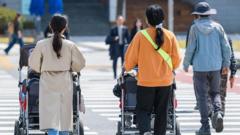South Korea is grappling with an unprecedented demographic challenge, marked by the world’s lowest birth rate. This sustained decline in fertility poses significant long-term concerns for the nation’s economic stability and societal structure. Paradoxically, amidst this widespread demographic contraction, the country’s fertility clinics are experiencing a notable surge in demand.
The increasing utilization of assisted reproductive technologies, particularly In Vitro Fertilization (IVF) treatments, is driving this boom. Clinics report a steady rise in patient numbers as more individuals and couples seek medical intervention to conceive. This growing reliance on fertility services highlights a determined effort by many South Koreans to start or expand their families, even as the national birth statistics continue to fall.
The expanding fertility sector reflects a complex interplay of societal pressures and individual aspirations in a country deeply concerned about its future population. While the rise in IVF treatments alone cannot reverse the broader demographic crisis, it represents a visible and growing response from citizens actively seeking to have children. This trend offers a measure of optimism in the ongoing national discussion about reversing the declining birth rates.



